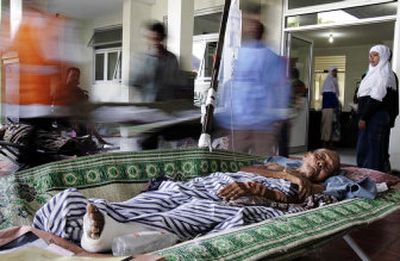Quake victims overwhelm hospital

BANTUL, Indonesia – The main hospital in the district hardest hit by Indonesia’s killer earthquake is running short of blood and splints. Victims cram corridors and the parking lot, sleeping on scraps of cardboard, some waiting an entire day for care.
Four days after the quake struck the Indonesian island of Java, patients occupied every available spot Wednesday in the hot, dirty hospital in Bantul district.
Many were still wearing the clothes they had on when the magnitude-6.3 quake struck early Saturday, killing more than 6,200 people and injuring some 30,000 in this region of rice farming communities.
“Ninety percent of the victims have fractures,” said Bantul Hospital’s emergency coordinator, Dr. Hidayat, who like many Indonesians uses only one name.
Medical supplies, rice, water and tarps were delivered to the disaster zone Wednesday to help about 650,000 displaced people, but many said the international aid was taking too long to get there.
Doctors said there have been few amputations, unlike the hundreds of victims who lost limbs after the massive 2004 Indian Ocean tsunami, which killed 131,000 people in Indonesia’s remote Aceh province alone.
The latest disaster happened on central, densely populated Java. While the destruction was widespread, covering hundreds of square miles of mostly farming communities to the south of the ancient city of Yogyakarta, roads remained open and emergency medical aid arrived quickly.
At least 45 community health centers and 44 primary health units were damaged by the quake, the United Nations said. Several portable field hospitals and at least 10 mobile clinics have been set up to cope with the injuries, it said.
Bantul Hospital continues to receive about 50 patients a day. It is packed with more than 400 victims and their families – about four times its normal capacity. Since Saturday, its approximately 30 doctors have seen more than 2,000 patients, Hidayat said.